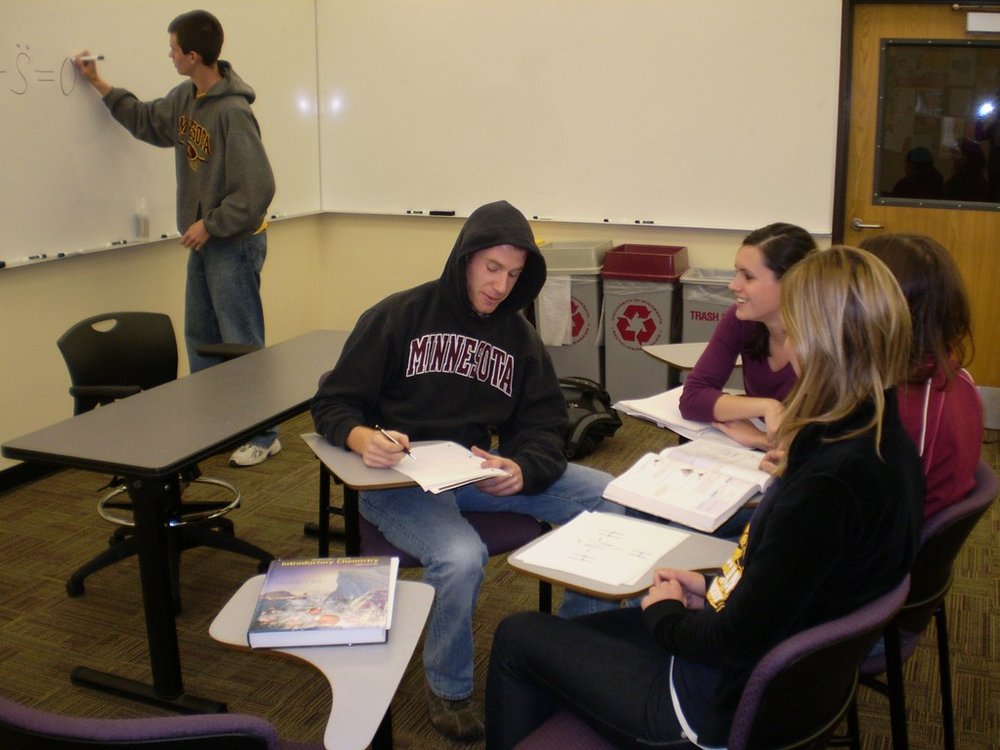 From Inside HigherEd by Scott Jaschik. "A theme of several studies in the last year has been that there are plenty of academically talented low-income students who for some combination of reasons are not applying to competitive colleges to which they would probably be admitted. A new study along those lines -- this time documenting the impact of intense college counseling -- was released Monday by the National Bureau of Economic Research. The study (abstract available here) found that a nonprofit group that focuses on college counseling in Minneapolis-St. Paul had a significant impact in increasing the rate at which low-income students enrolled in four-year colleges, including competitive institutions.
From Inside HigherEd by Scott Jaschik. "A theme of several studies in the last year has been that there are plenty of academically talented low-income students who for some combination of reasons are not applying to competitive colleges to which they would probably be admitted. A new study along those lines -- this time documenting the impact of intense college counseling -- was released Monday by the National Bureau of Economic Research. The study (abstract available here) found that a nonprofit group that focuses on college counseling in Minneapolis-St. Paul had a significant impact in increasing the rate at which low-income students enrolled in four-year colleges, including competitive institutions.
 The study was conducted by Christopher Avery of Harvard University -- co-author (with Caroline Hoxby of Stanford University) of a study released in December that found that most highly talented, low-income students never apply to a single competitive college. That work has set off widespread discussions about what sort of interventions might make a difference. Avery's new study looks at College Possible, a program that provides in-depth college counseling as well as tutoring on the ACT or SAT. Avery was able to study the impact of the program by comparing results on College Possible participants with those who applied to (and were not admitted to) the program despite having slightly better academic preparation. The study found no statistically significant gains in ACT scores for those who participated in the program. Avery writes, however, that this may understate the impact of the program, because he suspects that some of those who didn't get into College Possible found test-prep services elsewhere. But the study found a significant impact on College Possible participants in applying to and enrolling in four-year colleges, and especially to competitive colleges. More than 45 percent of the students in the College Possible program enrolled at a four-year college, while the figure in the control group was 34 percent. And the most popular college among those in the program was Augsburg College, a competitive liberal arts college that did not enroll a single student from the control group (though some would appear to have been academically qualified had they applied). The findings could be significant in that the earlier Avery-Hoxby study noted that low-income students who enroll in more competitive colleges are more likely to land at institutions with better graduation rates, more financial aid, and more resources to promote their academic success.
The study was conducted by Christopher Avery of Harvard University -- co-author (with Caroline Hoxby of Stanford University) of a study released in December that found that most highly talented, low-income students never apply to a single competitive college. That work has set off widespread discussions about what sort of interventions might make a difference. Avery's new study looks at College Possible, a program that provides in-depth college counseling as well as tutoring on the ACT or SAT. Avery was able to study the impact of the program by comparing results on College Possible participants with those who applied to (and were not admitted to) the program despite having slightly better academic preparation. The study found no statistically significant gains in ACT scores for those who participated in the program. Avery writes, however, that this may understate the impact of the program, because he suspects that some of those who didn't get into College Possible found test-prep services elsewhere. But the study found a significant impact on College Possible participants in applying to and enrolling in four-year colleges, and especially to competitive colleges. More than 45 percent of the students in the College Possible program enrolled at a four-year college, while the figure in the control group was 34 percent. And the most popular college among those in the program was Augsburg College, a competitive liberal arts college that did not enroll a single student from the control group (though some would appear to have been academically qualified had they applied). The findings could be significant in that the earlier Avery-Hoxby study noted that low-income students who enroll in more competitive colleges are more likely to land at institutions with better graduation rates, more financial aid, and more resources to promote their academic success.